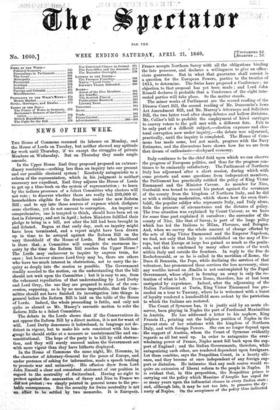NEWS OF THE WEEK.
THEE House of Commons resumed its labours on Monday, and the House of Lords on Tuesday, but neither showed any aptitude fig work until Thursday, if we except the struggles of private Members on Wednesday. But on Thursday they made ample amends.
In the Upper House Earl Grey proposed proposed an extraor- dinary resolution—nothing less than an inquiry into our present and our possible electoral system ! Resolutely antagonistic to a reform of the representation, which in his judgment is neith necessary nor expedient, Earl Grey adjures the House of Lords to get up a blue-book on the system of representation ; to learn by the tedious processes of a Select Committee why electors will not vote ; to discover whether there are really but 200,000 6/. householders eligible for the franchise under the new Reform. Bill ; and to spy into those sources of expense which disfigure sbme elections, yet do not amount to corruption. An inquiry so comprehensive, one is tempted to think, should have been set on foot in February, and not in April ; before Ministers fulfilled their pledge to bring in a bill, not after the bill had been brought in and debated. Begun at that early day, such an inquiry might have' been terminated, and a report might have been drawn up in time to be arrayed against the Reform Bill on the very threshhold of the House of Lords. But what likelihood is there that a Committee will complete the enormous in- quiry by the time the Reform Bill reaches the Upper House ? The Lords may endeavour to inquire by express train, for once ; but however sincere Lord Grey may be, there are others who have too much interest in obstruction, not to carry the in- quiry as deeply into the session as possible. The Government readily acceded to the motion, on the understanding that the bill should not wait upon the Committee ; but it is easy to see, from the vehement repudiation of that understanding by Lord Derby and Lord Grey, the use they are prepared to make of the con- cession, supposing, as is by no means improbable, that the Com- mittee should not have finished its investigation into things in general before the Reform Bill is laid on the table of the House of Lords. Indeed, the whole proceeding is futile, and only not quite so absurd as Mr. Massey's sarcastic motion to refer the Reform Bills to a Select Committee.
The debate in the Lords shows that if the Conservatives do not oppose the Reform Bill by a direct motion, it is not for want of will. Lord Derby denounces it beforehand, in language not de- ficient in vigour' but to make his acts consistent with his lan- guage he should strike at a measure so unstatesmanlike and un- constitutional. The hope of the party is to kill by cold obstruc- tion, and they will surely succeed unless the Government act with more vigour than they have hitherto displayed.
In the House of Commons the same night, Mr. Horsman, the character of Attorney-General for the peace of Europe, and .
under pretence of asking for information, made a speech tending to promote war and animosity. His effusion drew from Lord . John Russell a clear and consistent statement of our position in regard to the neutrality of. Switzerland. Having no right to
protest against the annexation of Savoy and Nice to France we did- not protest ; we simply pointed in general terms to the pro- bable consequences. But the security for Swiss neutrality is not an affair to be settled by two monarchs. It is European.
France accepts Northern Savoy with all the obligations binding the late possessor, and declares a willingness to give an effica- cious guarantee. But in what that guarantee shall consist is a question for the European Powers, parties to the treaties of 1815, to determine. The Swiss have proposed a Conference ; no objeetion to that proposal has yet been made ; and Lord John Russell declares it probable that a Conference of the eight inte- rested parties will take place. So the matter stands.
The minor works of Parliament are the second reading of the Divorce Court Bill, the second reading of Mr. Duncombe's Jews Act Amendment Bill, and Mr. Murray's Attorneys and Solicitors Bill, the two latter read after sharp debates and hollow divisions. Mr.. Collier's bill to prohibit the employment of hired carriages to convey voters to the poll met with a different fate. Felt to be only part of a difficult subject,--election expenses and elec- toral corruption now under inquiry,—the debate was adjourned, practically, until the inquiry is completed. The House of Com- mons has made some, but not much, progress with the Navy Estimates, and the discussions have shown how far we are from that dream of enthusiasts—dockyard economy.


























